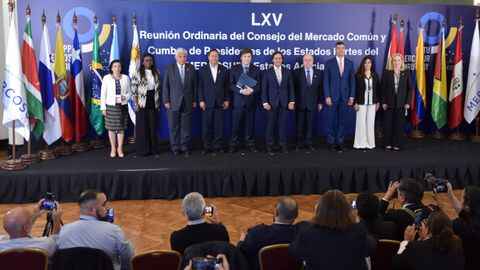In order to establish a massive free-trade area with a combined GDP of $21.3 trillion, the deal seeks to remove the majority of import levies between the EU and Mercosur.
Ursula von der Leyen, the head of the European Commission, stated that the EU and four South American nations had reached a massive but contentious trade agreement that is opposed by France and many European farmers.
Von der Leyen declared, “This is a win-win agreement,” while in Uruguay on Friday for a summit of the Mercosur bloc, which is part of the pact and also includes Brazil, Argentina, and Paraguay.
According to the deal, a vast free-trade area with over 700 million people will be established.
However, the agreement still requires approval from the European Parliament and at least 15 of the 27 EU members, which together account for 65% of the EU’s population.
Almost 25 years in the making, von der Leyen referred to the deal as “a truly historic milestone” that would create trade bridges at a time when “strong winds are blowing in the opposite direction, towards isolation and fragmentation.”
However, COPA-COGECA, an organization of European farmers, promptly reaffirmed its opposition and organized a demonstration in Brussels on Monday.
“The European Parliament and EU countries “must now strongly dispute the contents of this agreement,” the umbrella group stated.
France has attempted to create a blocking minority of EU nations after being shattered by many farmer protests that claimed the pact would result in unfair competition.
According to Italian government sources, Rome feels “the conditions are not met” to support the agreement, while Poland has sided with France. Austria and the Netherlands have also voiced their concerns.
Sophie Primas, France’s trade minister, said AFP in a statement: “The tale doesn’t finish today…. The commission alone is guilty of this; the member states of the EU are not.
However, Spain and Germany, keen to expand trade prospects despite the dire outlook for their industrial sector, had firmly endorsed the EU-Mercosur agreement.
Olaf Scholz, the German chancellor, declared on X that “an important hurdle” had been cleared. The “historic agreement” described by Spanish Prime Minister Pedro Sanchez will create “an unprecedented economic bridge between Europe and Latin America.”
A note to farmers in the EU
The general terms of an agreement were reached in 2019, but due to a number of obstacles, including worries about how Brazilian farming will affect climate change, it was never approved.
In response to those concerns, von der Leyen stated: “The EU-Mercosur agreement reflects our steadfast commitment to the Paris Agreement (on fighting climate change) and to the fight against deforestation.”
The conclusion of discussions was praised by Brazilian President Luiz Inacio Lula da Silva, who had stated prior to the conference that he intended to finalize the agreement by the end of December.
To get it across the finish line, he claimed that the member nations had “invested enormous political and diplomatic capital” on X.
The final agreed text, he added, “is very different to the one announced in 2019.”
The agreement included revisions to chapters on government contracts, services, intellectual property, and the environment, according to people familiar with the talks who spoke to AFP.
“We have heard you, listened to your concerns, and we are acting on them,” von der Leyen said, specifically referring to European farmers. Strong protections are included in this agreement to keep your livelihoods protected.
Once approved, the agreement would make it easier for the EU to export pharmaceuticals, machinery, and automobiles to South America.
In exchange, there would be fewer restrictions on the sale of beef, sugar, rice, honey, soybeans, and other items to Europe by Brazil and its neighbors, which are major agricultural producers.






